英汉成语的翻译
- 格式:ppt
- 大小:421.01 KB
- 文档页数:37
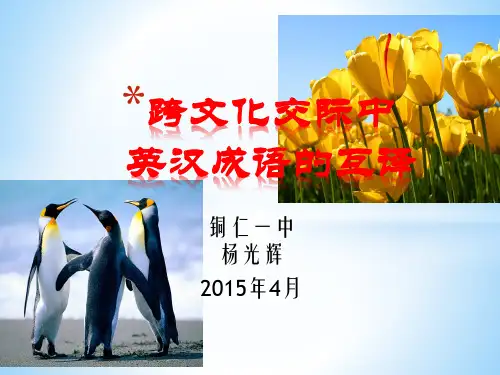
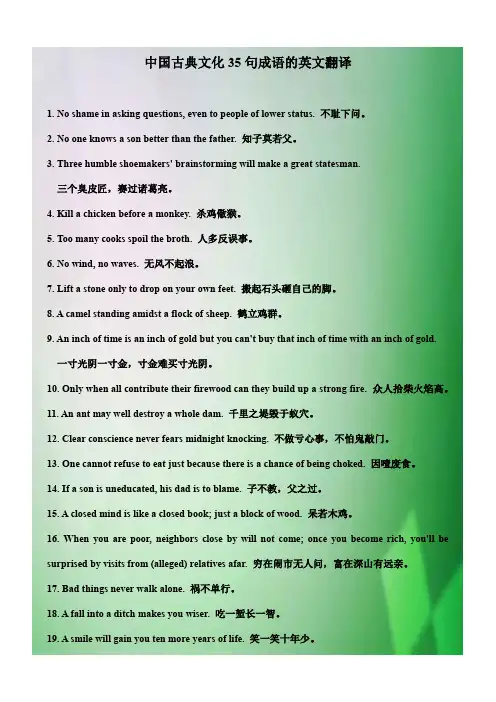
中国古典文化35句成语的英文翻译1. No shame in asking questions, even to people of lower status. 不耻下问。
2. No one knows a son better than the father. 知子莫若父。
3. Three humble shoemakers' brainstorming will make a great statesman.三个臭皮匠,赛过诸葛亮。
4. Kill a chicken before a monkey. 杀鸡儆猴。
5. Too many cooks spoil the broth. 人多反误事。
6. No wind, no waves. 无风不起浪。
7. Lift a stone only to drop on your own feet. 搬起石头砸自己的脚。
8. A camel standing amidst a flock of sheep. 鹤立鸡群。
9. An inch of time is an inch of gold but you can't buy that inch of time with an inch of gold.一寸光阴一寸金,寸金难买寸光阴。
10. Only when all contribute their firewood can they build up a strong fire. 众人拾柴火焰高。
11. An ant may well destroy a whole dam. 千里之堤毁于蚁穴。
12. Clear conscience never fears midnight knocking. 不做亏心事,不怕鬼敲门。
13. One cannot refuse to eat just because there is a chance of being choked. 因噎废食。
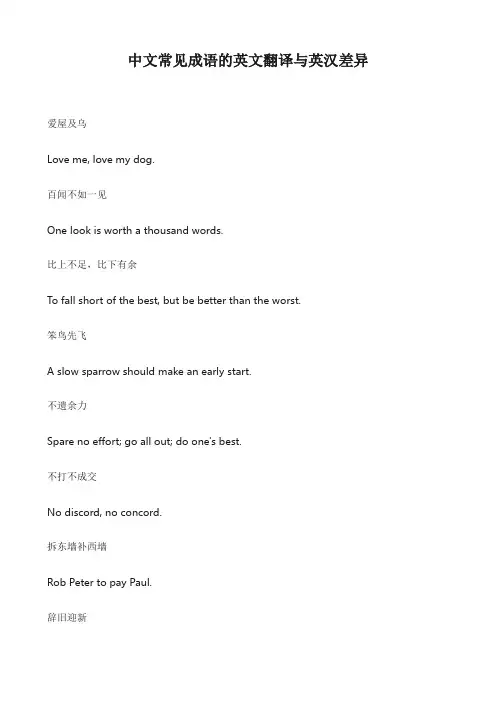
中文常见成语的英文翻译与英汉差异爱屋及乌Love me, love my dog.百闻不如一见One look is worth a thousand words.比上不足,比下有余To fall short of the best, but be better than the worst.笨鸟先飞A slow sparrow should make an early start.不遗余力Spare no effort; go all out; do one's best.不打不成交No discord, no concord.拆东墙补西墙Rob Peter to pay Paul.辞旧迎新Bid farewell to the old and usher in the new.大事化小,小事化了Try first to make their mistake sound less serious and then to reduce it to nothing at all.大开眼界Broaden one's horizon; be an eye-opener.国泰民安The country flourishes and people live in peace.过犹不及Going beyond the limit is as bad as falling short;excess is just as bad as deficiency;too much is as bad as too little.好了伤疤忘了疼Once on shore, one prays no more.好事不出门,坏事传千里Bad news travels fast.和气生财Harmony brings wealth;friendliness is conducive to business success.活到老学到老Never too old to learn.既往不咎Let bygones be bygones.金无足赤,人无完人There are spots even on the sun.金玉满堂Treasures fill the home.脚踏实地Be down-to-earth.脚踩两只船Sit on the fence; be a fence-sitter; have a foot in either camp. 君子之交淡如水A hedge between keeps friendship green.已成定局Cut and dried.礼尚往来Courtesy calls for reciprocity.留得青山在,不怕没柴烧Where there is life, there is hope.马到成功Achieve immediate victory; win instant success.名利双收Gain both fame and wealth.茅塞顿开Be suddenly enlightened.没有规矩,不成方圆Nothing can be accomplished without norms or standards.每逢佳节倍思亲On festive occasions more than ever one thinks of one's dear ones far away. 谋事在人,成事在天Man proposes; God disposes.弄巧成拙Make a fool of oneself in trying to be smart.赔了夫人又折兵Suffer a double loss; lose the bait along with the fish.抛砖引玉A modest spur to induce others to come forward with valuable contributions; throw a sprat to catch a mackerel.破釜沉舟Cut off all means of retreat;burn one's own way of retreat and be determined to fight to the end.抢得先机Take the preemptive opportunities.巧妇难为无米之炊One can't make bricks without straw.千里之行始于足下A thousand-li journey begins with the first step--the highest eminence is to be gained step by step.前事不忘,后事之师Past experience, if not forgotten, is a guide for the future.前怕狼,后怕虎Fear wolves ahead and tigers behind; hesitate in doing something.强龙难压地头蛇The mighty dragon is no match for the native serpent.瑞雪兆丰年A fall of seasonal snow gives promise of a fruitful year.人逢喜事精神爽People are in high spirits when involved in happy events.世上无难事,只怕有心人Where there is a will, there is a way.世外桃源A retreat away from the turmoil of the world.人之初,性本善Humans are born good.上有天堂,下有苏杭Just as there is paradise in heaven, there are Suzhou and Hangzhou on earth 塞翁失马,焉知非福A blessing in disguise;Every cloud has a silver lining.三十而立A man should be independent at the age of thirty. /At thirty, a man should be able to think for himself.水涨船高A ship rises with the tide时不我待Time and tide wait for no man.杀鸡用牛刀Use a steam-hammer to crack nuts.实事求是Seek truth from facts; be practical and realistic; be true to facts.说曹操,曹操到Speak of the devil.实话实说Speak the plain truth; call a spade a spade; tell it as it is.实践是检验真理的唯一标准Practice is the sole criterion for testing truth.韬光养晦Hide one's capacities and bide one's time.糖衣炮弹Sugar-coated bullets.天有不测风云Anything unexpected may happen. a bolt from the blue.团结就是力量Unity is strength.跳进黄河洗不清Even if one jumped into the Yellow River, one can not wash oneself clean - there's nothing one can do to clear one's name歪风邪气Unhealthy trends and vulgar practices.物以类聚,人以群分Birds of a feather flock together.望子成龙Hold high hopes for one's child.唯利是图Seek nothing but profits; be blind to all but one's own interests.无中生有A sheer fabrication out of nothing; fabricate rumors out of thin air.无风不起浪There are no waves without wind. Nothing comes of nothing.徇私枉法Twist the law to suit one's own purpose.新官上任三把火A new broom sweeps clean.蓄势待发Accumulate strength for a take-off.心想事成May all your wish come true.心照不宣Have a tacit understanding; thoroughly understand each other, without havingexchanged a word of explanation.先入为主First impressions are firmly entrenched.先下手为强He who strikes first gains the advantage.The best defense is offense.热锅上的蚂蚁Ants on a hot pan现身说法Warn people by taking oneself as an example.息事宁人Pour oil on troubled waters; patch up a quarrel and reconcile the parties concerned. 循序渐进Proceed in an orderly way and step by step; advance gradually in due order.严以律己,宽以待人Be strict with oneself and lenient with others.有情人终成眷属Jack shall have Jill, all shall be well.有钱能使鬼推磨Money makes the mare go./ Money talks.有识之士A man of insight.有勇无谋Bold but not crafty.有缘千里来相会Separated as we are thousands of miles apart, we come together as if by predestination.与时俱进Keep pace with the times.以人为本People-oriented.因材施教Teach students according to their aptitude.欲穷千里目,更上一层楼To ascend another storey to see a thousand miles further; Ascend further, were you to look farther.欲速则不达Haste makes waste.More haste, less speed.优胜劣汰Survival of the fittest.英雄所见略同Great minds think alike.冤家宜解不宜结Better make friends than make enemies.冤假错案Cases in which people were unjustly, falsely or wrongly charged or sentenced; unjust, false or wrong cases.一言既出,驷马难追A promise is a promise.A real man never goes back on his words.招财进宝Bring in wealth and treasure.债台高筑Become debt-ridden.众矢之的Target of public criticism.纸上谈兵Be an armchair strategist.纸包不住火You can't wrap fire in paper.What's done by night appears by day.左右为难Caught in a dilemma; between the devil and the deep blue sea.英语学习应注意的英汉差异英语重形合(hypotaxis),汉语重意合(parataxis) 。
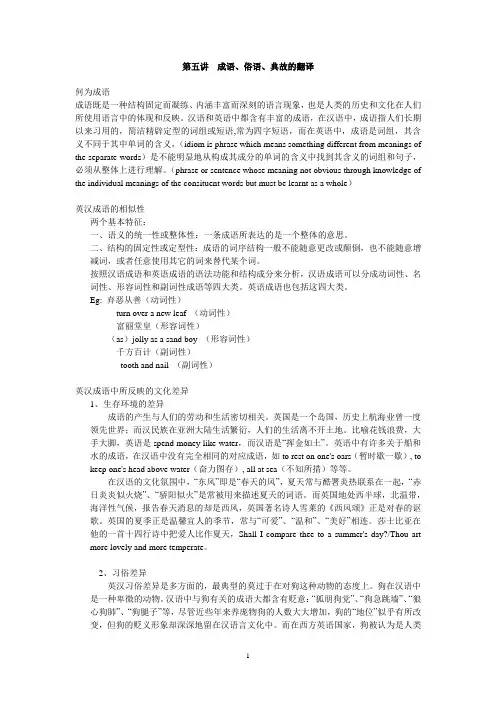
第五讲成语、俗语、典故的翻译何为成语成语既是一种结构固定而凝练、内涵丰富而深刻的语言现象,也是人类的历史和文化在人们所使用语言中的体现和反映。
汉语和英语中都含有丰富的成语,在汉语中,成语指人们长期以来习用的,简洁精辟定型的词组或短语,常为四字短语,而在英语中,成语是词组,其含义不同于其中单词的含义,(idiom is phrase which means something different from meanings of the separate words)是不能明显地从构成其成分的单词的含义中找到其含义的词组和句子,必须从整体上进行理解。
(phrase or sentence whose meaning not obvious through knowledge of the individual meanings of the consituent words but must be learnt as a whole)英汉成语的相似性两个基本特征:一、语义的统一性或整体性:一条成语所表达的是一个整体的意思。
二、结构的固定性或定型性:成语的词序结构一般不能随意更改或颠倒,也不能随意增减词,或者任意使用其它的词来替代某个词。
按照汉语成语和英语成语的语法功能和结构成分来分析,汉语成语可以分成动词性、名词性、形容词性和副词性成语等四大类。
英语成语也包括这四大类。
Eg: 弃恶从善(动词性)turn over a new leaf (动词性)富丽堂皇(形容词性)(as)jolly as a sand boy (形容词性)千方百计(副词性)tooth and nail (副词性)英汉成语中所反映的文化差异1、生存环境的差异成语的产生与人们的劳动和生活密切相关。
英国是一个岛国,历史上航海业曾一度领先世界;而汉民族在亚洲大陆生活繁衍,人们的生活离不开土地。
比喻花钱浪费,大手大脚,英语是spend money like water,而汉语是“挥金如土”。
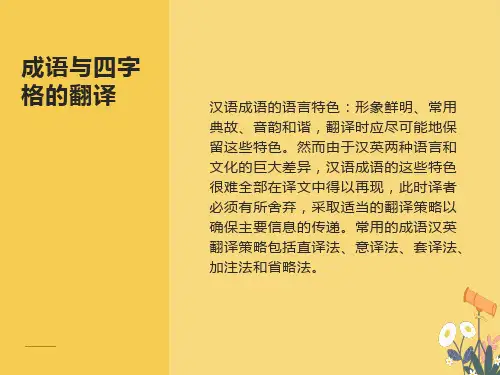
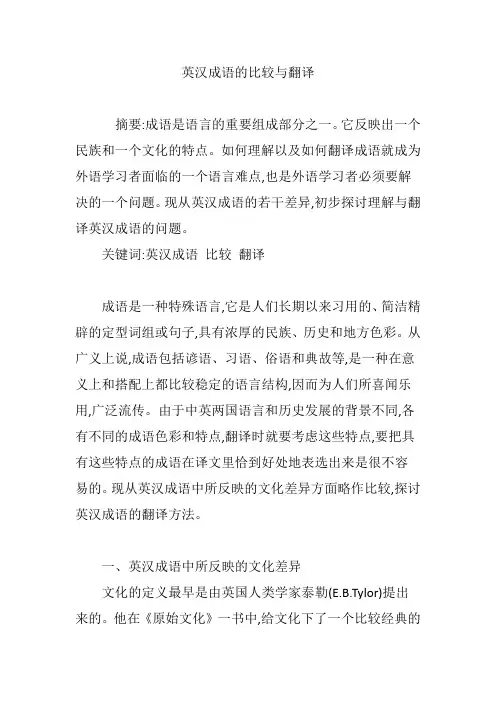
英汉成语的比较与翻译摘要:成语是语言的重要组成部分之一。
它反映出一个民族和一个文化的特点。
如何理解以及如何翻译成语就成为外语学习者面临的一个语言难点,也是外语学习者必须要解决的一个问题。
现从英汉成语的若干差异,初步探讨理解与翻译英汉成语的问题。
关键词:英汉成语比较翻译成语是一种特殊语言,它是人们长期以来习用的、简洁精辟的定型词组或句子,具有浓厚的民族、历史和地方色彩。
从广义上说,成语包括谚语、习语、俗语和典故等,是一种在意义上和搭配上都比较稳定的语言结构,因而为人们所喜闻乐用,广泛流传。
由于中英两国语言和历史发展的背景不同,各有不同的成语色彩和特点,翻译时就要考虑这些特点,要把具有这些特点的成语在译文里恰到好处地表选出来是很不容易的。
现从英汉成语中所反映的文化差异方面略作比较,探讨英汉成语的翻译方法。
一、英汉成语中所反映的文化差异文化的定义最早是由英国人类学家泰勒(E.B.Tylor)提出来的。
他在《原始文化》一书中,给文化下了一个比较经典的定义:“文化是一个复合体,其中包括知识、信仰、艺术、法律、道德、风俗以及人作为社会成员而获得的任何其他能力和习惯。
”语言是文化的载体,每一种语言都具有民族文化的烙印。
英汉成语的若干差异主要表现在以下几个方面:1. 社会习俗上的差异风俗习惯的差异是文化差异的一个主要方面,在成语当中有较多的反映,特别是在动物形象上。
例如:英语中的dog被视为一种宠物,英国人普遍对狗有好感,很多家庭都养狗,由此产生了一些与狗有关的成语。
如:Love me,love my dog(爱屋及乌),top dog(重要的人),Every dog has his day(凡人皆有得意日)等。
而汉语中的狗则多带有贬义色彩,常用来形容和比喻坏人坏事。
例如:狗仗人势、狗胆包天、狼心狗肺等等。
不同的民族心理对不同的事物做出了迥异的价值取向。
在中国传统文化中,龙象征着吉利,汉语中与龙有关的成语一般都含褒义。
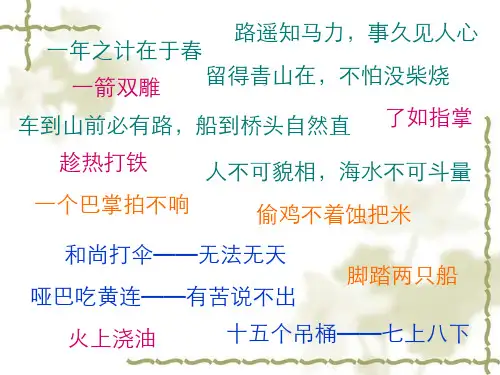
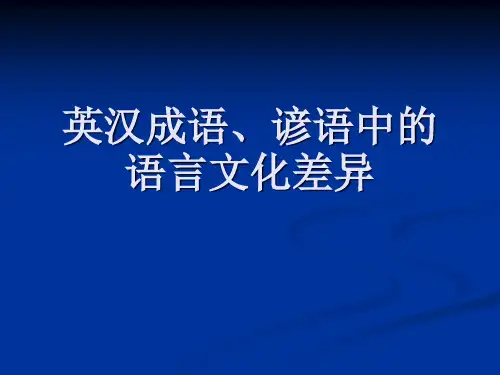
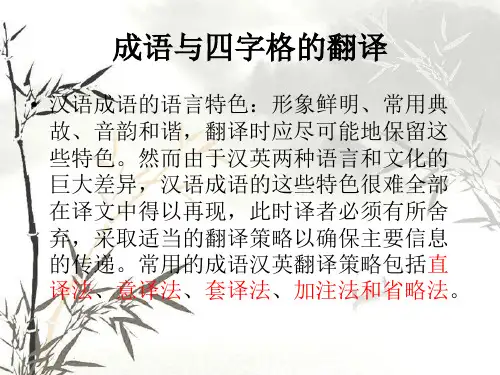
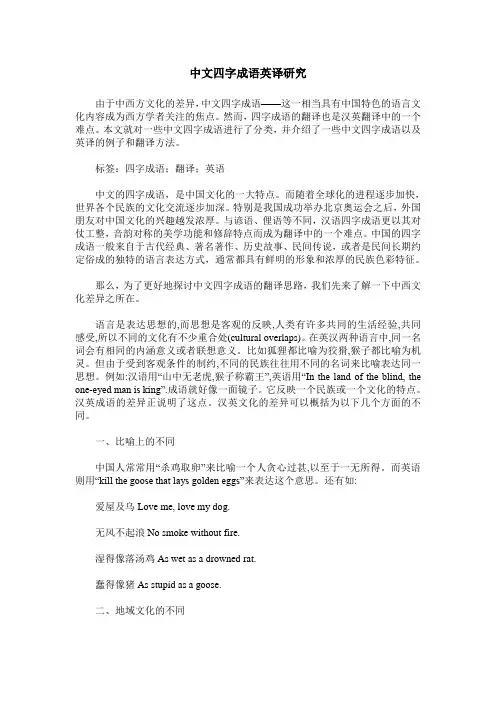
中文四字成语英译研究由于中西方文化的差异,中文四字成语——这一相当具有中国特色的语言文化内容成为西方学者关注的焦点。
然而,四字成语的翻译也是汉英翻译中的一个难点。
本文就对一些中文四字成语进行了分类,并介绍了一些中文四字成语以及英译的例子和翻译方法。
标签:四字成语;翻译;英语中文的四字成语,是中国文化的一大特点。
而随着全球化的进程逐步加快,世界各个民族的文化交流逐步加深。
特别是我国成功举办北京奥运会之后,外国朋友对中国文化的兴趣越发浓厚。
与谚语、俚语等不同,汉语四字成语更以其对仗工整,音韵对称的美学功能和修辞特点而成为翻译中的一个难点。
中国的四字成语一般来自于古代经典、著名著作、历史故事、民间传说,或者是民间长期约定俗成的独特的语言表达方式,通常都具有鲜明的形象和浓厚的民族色彩特征。
那么,为了更好地探讨中文四字成语的翻译思路,我们先来了解一下中西文化差异之所在。
语言是表达思想的,而思想是客观的反映,人类有许多共同的生活经验,共同感受,所以不同的文化有不少重合处(cultural overlaps)。
在英汉两种语言中,同一名词会有相同的内涵意义或者联想意义。
比如狐狸都比喻为狡猾,猴子都比喻为机灵。
但由于受到客观条件的制约,不同的民族往往用不同的名词来比喻表达同一思想。
例如:汉语用“山中无老虎,猴子称霸王”,英语用“In the land of the blind, the one-eyed man is king”.成语就好像一面镜子。
它反映一个民族或一个文化的特点。
汉英成语的差异正说明了这点。
汉英文化的差异可以概括为以下几个方面的不同。
一、比喻上的不同中国人常常用“杀鸡取卵”来比喻一个人贪心过甚,以至于一无所得。
而英语则用“kill the goose that lays golden eggs”来表达这个意思。
还有如:爱屋及乌Love me, love my dog.无风不起浪No smoke without fire.湿得像落汤鸡As wet as a drowned rat.蠢得像猪As stupid as a goose.二、地域文化的不同中国人常常用“雨后春笋”来形容一般事物的迅速发展和大量涌现。

浅析四字成语在英译汉中的使用
四字成语,源于古典文学,被称作“四声贴”,在日常生活中非常普及。
它们是由两个或两个以上的汉字组成的,通常有两个汉字的谐音,而汉字的谐音可由一个或多个音素来表示。
现在,它们不仅流行于中国,也被广泛用于英译汉中。
从英译汉的角度来看,四字成语在英语翻译中可以说是最重要的部分之一。
由于四字成语有较为明确的含义,而且每个汉字都有不同的拼音,翻译时可以按照英文的习惯,把每个汉字的拼音表示出来,让英语读者也能够理解所表达的内容。
例如,“礼尚往来”可以写为“Lǐ Shàng Wǎng Lái”,以此表达“Courtesy is a two-way street”(礼貌是双向街道)的含义。
另外,由于成语大多表达的是抽象的道理,翻译者可以使用特定的情景说明,来更好地表达“四声贴”所包含的含义。
例如“虎父无犬子”可以写为“A tiger fatherwillnot have an aolpup”,表达出“Where the father is tough,the child will naturally obey”(父亲苛刻,孩子自然恭顺)的概念。
四字成语在英语翻译中的使用不仅可以使英语读者更容易理解原文,还可以使英文更加准确、精炼。
了解英语译汉方面的四字成语,使他们能在日常生活中有效地运用它们,有助于他们更好地学习和运用英语知识。
综上所述,四字成语在英语翻译中十分重要,它们的使用可以使英文变得更加准确、精炼,有助于掌握英语的知识。
最后,希望广大爱好英语的朋友们多积极参与,多多阅读,勤攻习,精进会让您的英语技能有质的提高哦!。
动物在英汉成语中的喻意对比据(现代汉语词典)解释,成语是“人们长期以来习用的,形式简洁而意思精辟的定型的词组或短句。
汉语的成语大多由四个字组成。
(汉英)译成语为set phrase;idiom。
前者相当于“定型词组”,后者相当于“习语”,和成语的概念都不完全对等。
但英语这两个词比较接近成语的意思,尤其是后者,经常作为成语的对应词。
以下是几种动物在英语idiom里和汉语成语中的不同联想对比:一、狗狗对于英国人来说,既可以用来看门或打猎,也能作为人的伴侣和爱物。
所以,英国人对狗一般不抱恶感,倒反而有感情。
不过英国是受外来影响很大的语言,它的成语中狗的形象含有贬义的也有,但令人厌恶的、可鄙的含义不多,这和汉语是大不一样的。
英语口语里以“dog”指人很平常,汉语就不行。
“Dog”不过是“家伙”的意思,本身并无贬义,视其前面的形容词不同而具有不同的含义,例如a lucky dog(幸运儿),a gay dog(喜欢玩乐的人),a surly dog(性情古怪的人),a dumb dog(沉默不语的人),a dirty dog(坏蛋)等。
单独用“dog”指“坏蛋”,“废物”是旧用法。
不过在口语里,dog有时也指“社会上不太体面的人”。
如:He was a bit of a dog in his younger days。
但“hot dog”却是夹在面包中吃的红香肠。
此外,a dead dog(毫无价值的东西,废物),a dog in the manger(占着茅坑不拉屎的人)都有一定的贬义。
Lead a dog’s life(过着令人烦恼的生活),die a dog’s death, die like a dog(死得可鄙或可悲),go to the dogs(堕落,毁灭),let sleeping dogs lie(不要惹是生非)等成语中“dog”的形象也都不好。
但是,help a lame dog over a stile(助人渡过难关)中的“dog”是值得同情的对象。
成语在英文中的运用可以通过直译、意译和混合译法等方式进行。
1.直译法:直译法是将汉语成语直接翻译成英文成语的方法。
例如,“物以类聚”可以
翻译为“birds of a feather flock together”。
2.意译法:意译法是指将汉语成语的意思翻译成英文成语,而不是直接翻译成语本
身。
例如,“知足常乐”可以翻译为“contentment brings happiness”。
3.混合译法:混合译法是指将汉语成语的一部分直译,另一部分意译的方法。
例如,
“画蛇添足”可以翻译为“paint the lily”,其中“paint the lily”是英文成语,意为“多此一举”。
总之,成语在英文中的运用需要灵活变通,根据具体情况选择合适的翻译方法。
画蛇添⾜ Drawing a Snake and Adding Feet to It In the past a family in the State of Chu made sacrificial offers to their ancestors, and after that they rewarded the people who helped in the ceremony with the pot of wine used in it. 从前,楚国有⼀户⼈家,祭完祖宗以后,把⼀壶祭祀时⽤过的酒,赏给帮助办事的⼈喝。
There were many helpers but only one pot of wine. Who should drink it? Someone suggested: 办事的⼈很多,可是酒只有⼀壶,到底给谁喝呢?有⼈提议说: "Each person is to draw a snake on the ground. Whoever draws fastest and most lifelike will get the pot of wine." “各⼈都在地上画⼀条蛇,谁画得快、画得像,就把这壶酒给谁喝。
” Everyone thought this was a good idea. ⼤家都认为这个办法很好。
One man drew very fast, finished it in the twinkling of an eye, and was given the pot of wine. At this moment, he saw that the others had not yet finished, so he wanted to flaunt his skill once more. He said proudly: 有⼀个⼈画得很快,⼀转眼,就把蛇画好了。